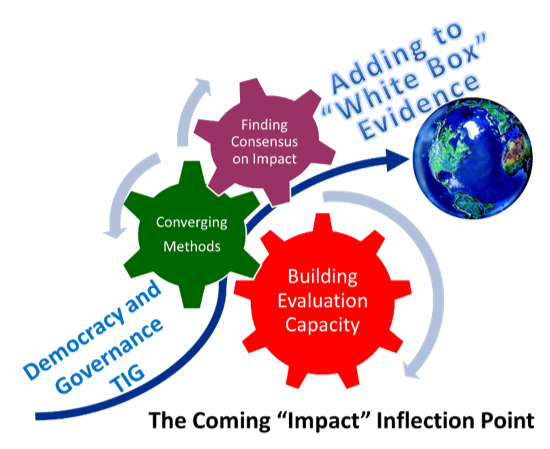Hello, and welcome to the Democracy and Governance (DG) TIG Evaluation Week! This is Denise Baer, DG TIG Chair, adjunct faculty in the Elliott School of International Affairs at George Washington University and Director of Evaluation for the Center for International Private Enterprise (CIPE).
Hot Tip: This week is designed to showcase some of the exciting innovations in evaluation methods that DG TIG members are using to assess democracy and governance.
 Like me, many of our members straddle the two worlds of academic and practitioner evaluation. This makes us especially keen to bridge the RESEARCH-practice and the PRACTICE-research gaps inherent in our work – this is our “inflection point”. The challenge here is that the DG TIG is founded on two ideas – democracy and governance – that are — in philosopher W.B. Gallie’s terminology — “essentially contested concepts.”
Like me, many of our members straddle the two worlds of academic and practitioner evaluation. This makes us especially keen to bridge the RESEARCH-practice and the PRACTICE-research gaps inherent in our work – this is our “inflection point”. The challenge here is that the DG TIG is founded on two ideas – democracy and governance – that are — in philosopher W.B. Gallie’s terminology — “essentially contested concepts.”
Lessons Learned: In the new world of evidence-based policy and practice, the risks in evaluating projects designed to further democracy and governance include – as Gallie pointed out in 1956 — skepticism, dogmatism and eclecticism. As was concluded by the major academic study of democracy promotion – an objective of U.S. foreign assistance — conducted by the Pittsburgh-Vanderbilt team, “without a universally agreed upon standard for defining the dependent variable, the more difficult it is to measure the impact of democratization programs.” Academic experts have weighed in on the challenges from an American Political Science Association task force and a critique of the World Bank governance indicators a decade ago to the 2015 Journal of Democracy’s 25th anniversary edition.
The mission of the DG TIG, launched in 2014 to reflect the shared needs and interests of academics, practitioners, donors, implementers, evaluators and those being evaluated exists to provide a forum and community of support for the practice of evaluation of democracy and governance. DG programs seek to promote transparency, accountability and openness by fostering human rights, rule of law, independent media and other essential democratic institutions, including civil society and representative institutions. Because DG programs often occur in the context of transitioning political systems, and places with limited and closing political space, they have unique evaluation needs.
The DG TIG was founded at a time of challenge. Not only has the world seen 12 consecutive years where the number of net declines in political rights and civil liberties outnumber the gains – a refutation of the “wave” theory of continuous democratization, we need new ways to understand our work.
Twenty years ago Thomas Carothers described the practitioner world’s use the “Democracy Template.” Today as the DG TIG Week post will share, DG practitioners are going beyond the top-down and bottom-up strategies to consider democracy like markets as a complex “system” peopled by intentional stakeholders whose local ownership and governance quality matters in achieving impact.
Rad Resource: This week we have a number of DG TIG members describing methodological innovations that go beyond the pointless debate of attribution vs. contribution to help us flesh out the “white box” of impact that academics, donors and practitioners are now addressing. Please join us in this enterprise!
The American Evaluation Association is celebrating Democracy & Governance TIG Week with our colleagues in the Democracy & Governance Topical Interest Group. The contributions all this week to aea365 come from our DG TIG members. Do you have questions, concerns, kudos, or content to extend this aea365 contribution? Please add them in the comments section for this post on theaea365 webpage so that we may enrich our community of practice. Would you like to submit an aea365 Tip? Please send a note of interest to aea365@eval.org. aea365 is sponsored by theAmerican Evaluation Association and provides a Tip-a-Day by and for evaluators.
